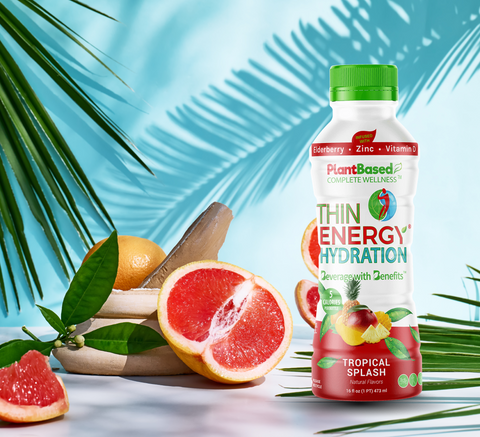Plant-based dieting has grown in popularity over the last few years.
But what exactly is it, how does it differ from veganism, and what benefits does it offer? More importantly, should you give it a try?
Read on to learn about these questions and many others.
What is a Plant-Based Diet?
A plant-based diet is one where you get the majority of your daily calories and nutrients from plant foods (1):
- Fruits
- Veggies
- Lentils
- Nuts
- Seeds
- Beans
- Coffee
- Tea
A common misconception is that plant-based dieting is the same as veganism, but that isn’t precisely true (1).
While both approaches heavily rely on plant foods, veganism prohibits all animal products (1). In contrast, a plant-based diet is one where people aim to eat mostly plants but can also enjoy some animal products: meat, fish, poultry, eggs, dairy, etc.
5 Fantastic Benefits of a Plant-Based Diet
- You Get to Eat Mostly Whole Foods
One notable advantage of plant-based dieting is that most of your daily calories come from whole or minimally-processed foods.
Given the Western diet's prevalence (an approach primarily based on processed junk with little nutritional value), going plant-based is a fantastic alternative.
- The Risk of Nutrient Deficiencies Drops Significantly
Nutrient deficiencies aren’t that common in healthy individuals, but there is still a risk. The issue with not getting enough of certain nutrients is that you might not notice anything for a long time.
Since plant-based diets are largely based on whole and nutritious foods, it’s easier to get enough of all the vitamins and minerals your body needs to function (2).
- Getting Fiber is Much Easier
Dietary fiber is a type of carbohydrate that the digestive system cannot completely break down. Getting enough of it is crucial for digestive health, regular bowel movements, and the cardiovascular system (3, 4).
Plant-based dieting is beneficial because most foods provide at least some amount of the nutrient (1). Eating various plant-based foods supplies your body with enough soluble and insoluble fiber.
- It Can Lead to Weight Loss
Another notable benefit of plant-based dieting is that it can lead to more effective and sustainable weight loss.
A recent paper pointed out that plant-based nutrition is an effective strategy for weight management because of (5):
- Greater satiety
- More voluminous foods
- Lower caloric density
- Reduced cholesterol intake
Here is a direct quote:
“Our data suggest that plant-based/vegan diets might play a significant role in future strategies for reducing body weight.”
- Research Suggests Notable Health Benefits
In addition to promoting weight loss and making it easier to get enough of various essential nutrients, numerous studies suggest that plant-based dieting can be effective against:
Final Words
A plant-based diet is excellent for everyone looking to lose weight, improve their health, and reduce the risk of nutrient deficiencies.
One drawback is that eating primarily plants can make it challenging to get the recommended 0.7 to 1 gram of protein per lb of body weight.
So, in addition to plants, followers of the dietary approach can include some high-protein animal foods (e.g., meat, eggs, etc.) and consider a plant-based protein powder (e.g., hemp, pea, or rice).
References
- Clem J, Barthel B. A Look at Plant-Based Diets. Mo Med. 2021 May-Jun;118(3):233-238. PMID: 34149083; PMCID: PMC8210981.
- Neufingerl N, Eilander A. Nutrient Intake and Status in Adults Consuming Plant-Based Diets Compared to Meat-Eaters: A Systematic Review. Nutrients. 2021 Dec 23;14(1):29. doi: 10.3390/nu14010029. PMID: 35010904; PMCID: PMC8746448.
- Barber TM, Kabisch S, Pfeiffer AFH, Weickert MO. The Health Benefits of Dietary Fibre. Nutrients. 2020 Oct 21;12(10):3209. doi: 10.3390/nu12103209. PMID: 33096647; PMCID: PMC7589116.
- McRae MP. Dietary Fiber Is Beneficial for the Prevention of Cardiovascular Disease: An Umbrella Review of Meta-analyses. J Chiropr Med. 2017 Dec;16(4):289-299. doi: 10.1016/j.jcm.2017.05.005. Epub 2017 Oct 25. PMID: 29276461; PMCID: PMC5731843.
- Ivanova S, Delattre C, Karcheva-Bahchevanska D, Benbasat N, Nalbantova V, Ivanov K. Plant-Based Diet as a Strategy for Weight Control. Foods. 2021 Dec 8;10(12):3052. doi: 10.3390/foods10123052. PMID: 34945602; PMCID: PMC8701327.
- Satija A, Bhupathiraju SN, Spiegelman D, Chiuve SE, Manson JE, Willett W, Rexrode KM, Rimm EB, Hu FB. Healthful and Unhealthful Plant-Based Diets and the Risk of Coronary Heart Disease in U.S. Adults. J Am Coll Cardiol. 2017 Jul 25;70(4):411-422. doi: 10.1016/j.jacc.2017.05.047. PMID: 28728684; PMCID: PMC5555375.
- Zhao Y, Zhan J, Wang Y, Wang D. The Relationship Between Plant-Based Diet and Risk of Digestive System Cancers: A Meta-Analysis Based on 3,059,009 Subjects. Front Public Health. 2022 Jun 3;10:892153. doi: 10.3389/fpubh.2022.892153. PMID: 35719615; PMCID: PMC9204183.
- Satija A, Bhupathiraju SN, Rimm EB, Spiegelman D, Chiuve SE, Borgi L, Willett WC, Manson JE, Sun Q, Hu FB. Plant-Based Dietary Patterns and Incidence of Type 2 Diabetes in US Men and Women: Results from Three Prospective Cohort Studies. PLoS Med. 2016 Jun 14;13(6):e1002039. doi: 10.1371/journal.pmed.1002039. PMID: 27299701; PMCID: PMC4907448.
- Jiang X, Huang J, Song D, Deng R, Wei J, Zhang Z. Increased Consumption of Fruit and Vegetables Is Related to a Reduced Risk of Cognitive Impairment and Dementia: Meta-Analysis. Front Aging Neurosci. 2017 Feb 7;9:18. doi: 10.3389/fnagi.2017.00018. PMID: 28223933; PMCID: PMC5293796.



